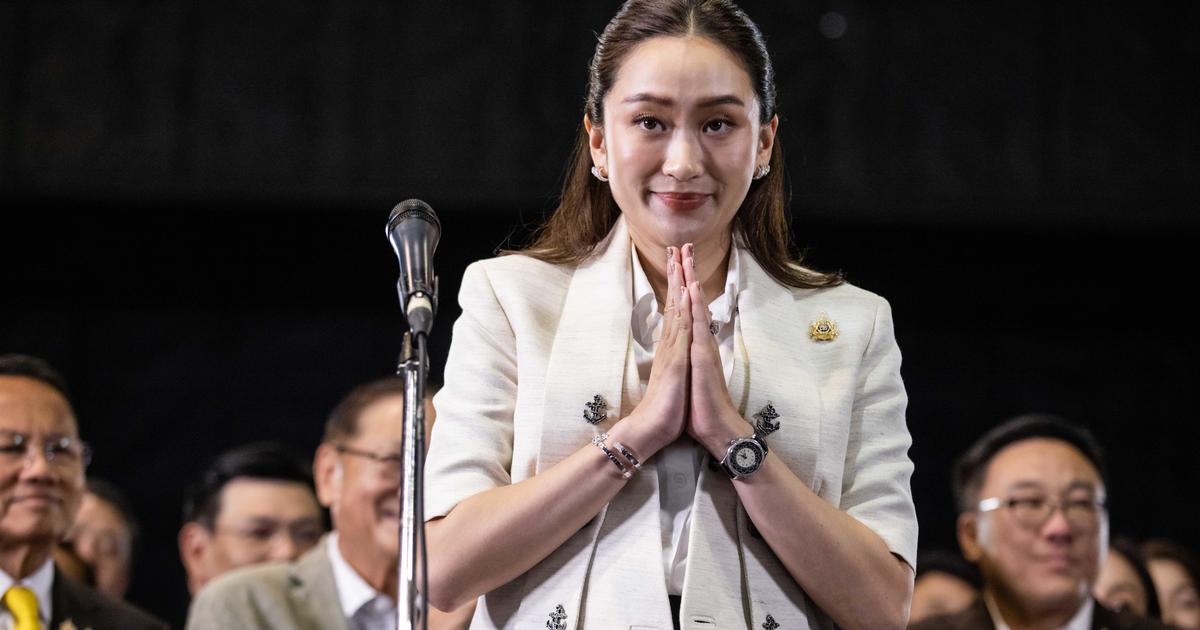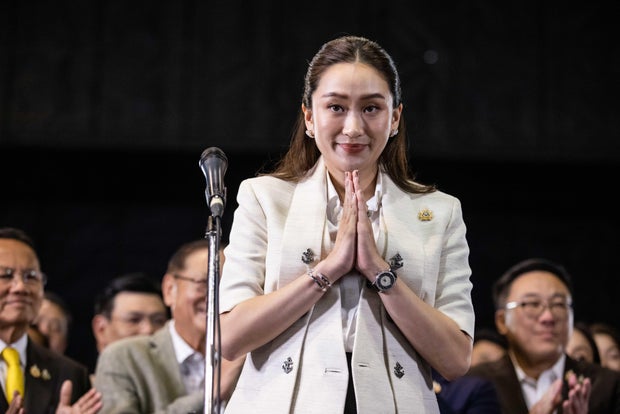Thailand’s Parliament elected Paetongtarn Shinawatra, the youngest daughter of the divisive former leader Thaksin Shinawatra, as prime minister Friday.
Paetongtarn becomes Thailand’s third leader from the Shinawatra family, after her father, who was ousted by coup before returning from exile last year, and her aunt Yingluck Shinawatra, who lives in exile. Paetongtarn also became Thailand’s second female prime minister after her aunt and the country’s youngest leader at 37.
As a sole nominee, she was confirmed by 319 votes in approval, with 145 voted against her and 27 abstained. Members of Parliament spent about an hour casting their votes in public one by one. Paetongtarn is the leader of the ruling Pheu Thai party but was not an elected lawmaker, which was not required for her to be a candidate for prime minister.
She will officially become prime minister with a royal endorsement, though the timing of that step wasn’t known.
Bloomberg
Paetongtarn received warm greetings and applause from members of her party before delivering her first speech after the Parliament vote at the party’s office in Bangkok. Admitting she was very excited, she said she was very “honored and happy,” and thanked members of Parliament for their votes.
“I really hope that I can make the people feel confident, that we can build the opportunity and the quality of life,” she said. “I hope that I can do my best to make the country go forward.”
The last prime minister was removed by the Constitutional Court two days ago over an ethics violation.
Paetongtarn’s father Thaksin is one of Thailand’s most popular but divisive political figures and was ousted by a military coup in 2006. He is widely seen as a de facto leader of Pheu Thai, the latest in a string of parties linked to him. His residual popularity and influence is a factor behind the political support for Paetongtarn.
Her public entry into politics came in 2021 when the Pheu Thai party announced she would lead an inclusion advisory committee. She was appointed as leader of Pheu Thai last year, after she was named one of its three prime ministerial candidates ahead of the polls.
When Paetongtarn was on the campaign trail for Pheu Thai, she acknowledged her family ties but insisted she was not just her father’s proxy.
“I am my dad’s daughter, always and forever, but I have my own decisions,” she told a reporter.
However, her father’s shadow is too big to be dismissed and her work will not be easy with him continuing to call political shots for Pheu Thai, said Petra Alderman, a political research fellow at England’s University of Birmingham.
“Thaksin was a political force to reckon with, but he was also a liability,” she said, “He has a tendency to overplay his political hand, so serving in his shadow has never been easy.”
Alderman noted that while Paetongtarn seemed to receive an overwhelming support from her party, the coalition and Pheu Thai voter base, those are not the only factors that will determine the course of her premiership.
“Who gets to govern in Thailand and for how long are questions that are often answered by unelected and unaccountable watchdog institutions, (such as) the Election Commission of Thailand and the Constitutional Court, or military coups,” she said.
Paetongtarn’s nomination followed the removal of Prime Minister Srettha Thavisin on Wednesday after less than a year in office. The Constitutional Court found him guilty of a serious ethical breach regarding his appointment of a Cabinet member who was jailed in connection with an alleged bribery attempt.
It was the second major ruling in a week to shake Thai politics. The same court last week dissolved the progressive Move Forward party, which won last year’s general election but was blocked from taking power. The party has already regrouped as the People’s Party.
Pheu Thai and its predecessors had won all national elections since 2001, with core populist policies pledging to solve economic problems and bridge income equality, until it lost to the reformist Move Forward in 2023. It, however, was given a chance to form a government after Move Forward was blocked from taking power by the previous Senate, a military-appointed body.
Move Forward was excluded from the coalition by Pheu Thai, which went on to join hands with parties affiliated with the military government that ousted it in a coup.
Thaksin returned to Thailand last year after years in exile in what was interpreted as part of a political bargain between Pheu Thai and their longstanding rivals in the conservative establishment to stop Move Forward Party from forming a government.
The former senators were given special power to veto a prime ministerial candidate by the constitution adopted in 2017 under a military government. However, that power expired when their term ended in May. New members of the Senate, selected in a convoluted process last month, do not retain the veto. It means that a candidate needs just a majority from the lower house.
The coalition under the leadership of Paetongtarn could strengthen their unity because Paetongtarn possesses something that Srettha does not – a direct line to her powerful father who has the final say – said Napon Jatusripitak, a political science researcher at Singapore’s ISEAS-Yusof Ishak Institute.
“In a strange way, it creates a clear chain of command and curbs factionalism,” he said. “Paetongtarn will be given clear jurisdictions on where she can exercise her own agency and where it is a matter between her father and the coalition members.”
With Move Forward dissolved and the party’s only prime ministerial candidate Pita Limjaroenrat banned from political activities, Napon believes the rest of major political parties would resume a “game of musical chairs” of the premiership race that has been put on hold “with an agreement to share power, regardless of who becomes the prime minister.”
“Most importantly, the overarching goal remains the same: to keep the music playing and exclude the reformists from power,” he said.
#Daughter #Thailands #prime #minister #set #countrys #youngest #leader

